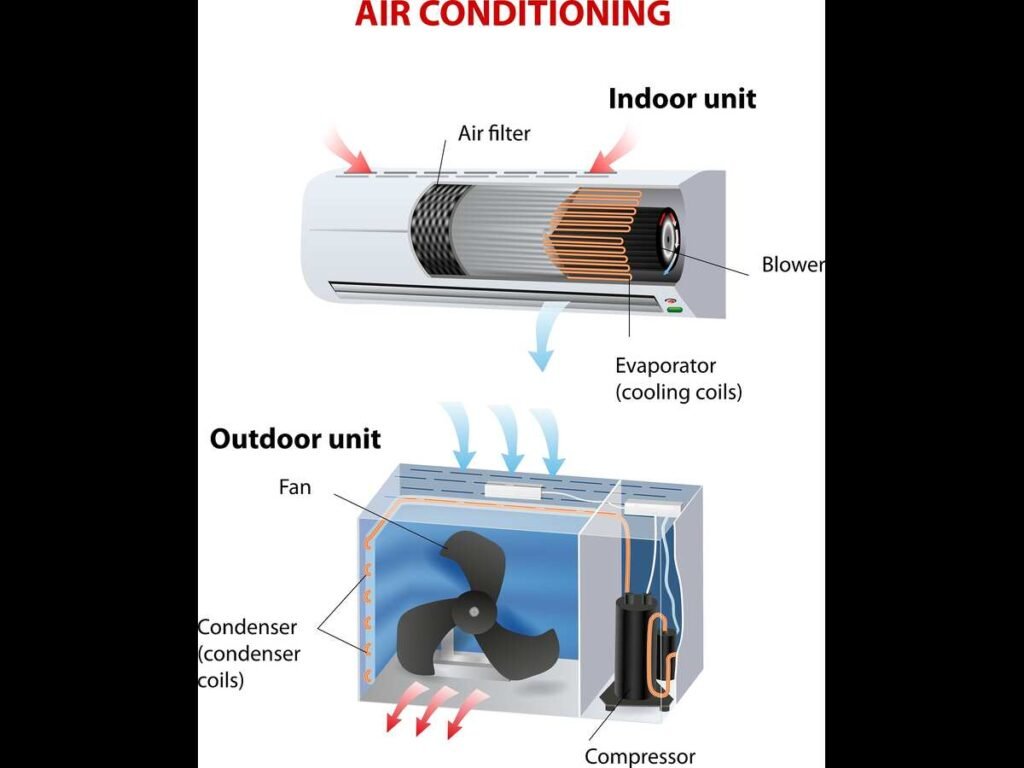Gas Heater vs Split System: When it comes to heating your home or office, choosing the right system can have a significant impact on your comfort, energy consumption, and monthly bills. Some of the most favored choices include gas heaters and split systems. Both have their merits, but which is more cost-effective to operate in the long run? This article breaks down the key factors to help you decide.
Understanding Gas Heaters and Split Systems
Gas Heaters
These systems are designed to heat spaces efficiently and quickly, making them ideal for cold climates or large areas. Gas heaters come in two main types: ducted gas heating systems and portable gas heaters. Their running costs are influenced by the price of gas, the system’s efficiency, and the size of the area being heated.
Split Systems
Split systems, also known as reverse-cycle air conditioners, can both heat and cool spaces. They operate by transferring heat between the indoor and outdoor units using a refrigerant. Split systems are powered by electricity and are particularly popular for their dual functionality.
Initial Investment vs. Operating Costs
Initial Costs
Gas Heater: Depending on the type and size, a gas heater typically costs less upfront than a split system. Installation for ducted gas heating, however, can add to the overall cost, especially if ductwork needs to be installed.
Split System: While the initial purchase cost can be higher, installation for a split system is relatively straightforward. Advanced models with smart features may increase the upfront cost.
Operating Costs
Operating costs are where the two systems differ significantly, and the better choice depends on various factors, including fuel prices, energy efficiency, and usage patterns.
Key Factors That Affect Operating Costs
Energy Efficiency
Gas heaters typically have efficiency ratings between 70% and 90%. High-efficiency models can reduce energy wastage, but the cost of gas can offset these savings.
Split systems, especially those with inverter technology, are designed to be highly efficient. Some modern units boast a coefficient of performance (COP) of 4 or higher, meaning they produce four times the heat per unit of electricity consumed.
Fuel and Electricity Prices
Split systems rely on electricity, and their running costs can vary significantly depending on electricity rates and usage during peak demand times.
Climate and Insulation
In colder regions, gas heaters often perform better as they provide consistent heat regardless of outside temperatures. They can be more economical in areas where gas is cheaper and readily available.
Split systems may be more cost-effective in moderate climates or well-insulated spaces, as they don’t need to work as hard to maintain comfortable temperatures.
Usage Patterns
If heating is required only occasionally or in small spaces, a gas heater (especially a portable one) might be more economical.
Environmental Considerations
Both systems have environmental impacts that should be considered:
Gas heaters emit carbon dioxide, contributing to greenhouse gas emissions. High-efficiency models and using biogas as a fuel source can mitigate this.
Split systems are generally more eco-friendly when powered by renewable electricity. However, the refrigerants used can have a high global warming potential if not properly managed.
Maintenance and Lifespan
Gas Heaters: Require regular maintenance to ensure safe operation, including checking for gas leaks and cleaning burners.
Split Systems: Require cleaning of filters and occasional servicing of refrigerant levels.
Which One Costs Less?
To decide whether a gas heater or split system is more economical for your home or office, consider these practical tips:
1. Assess Your Needs: For heating-only requirements in a colder climate, gas heaters may be more cost-effective. In milder regions where cooling is also needed, a split system could provide better value.
2. Calculate Long-Term Costs: Look beyond initial expenses and consider energy bills, maintenance, and lifespan.
3. Evaluate Energy Sources: Research local energy prices to understand how gas and electricity costs will affect your budget.
4. Prioritize Efficiency: Invest in high-efficiency models to save on operational costs and reduce environmental impact.
Conclusion
For spaces where heating is a priority and gas is affordable, a gas heater may offer lower operating costs. However, if versatility, energy efficiency, and cooling are also important, a split system could be the better long-term investment. Carefully evaluate your needs, compare costs, and consult with heating and cooling professionals to make an informed decision.
Whether you opt for a gas heater or a split system, ensuring proper installation and maintenance is key to maximizing efficiency and minimizing costs.
Discover ACJakarta.com – Your Trusted Air Conditioning Partner
Looking for reliable air conditioning solutions in Jakarta? ACJakarta.com is here to meet your cooling needs with professionalism and efficiency. Whether you need installation, maintenance, or repair services, we’ve got you covered.
At service ac jakarta, we specialize in providing top-quality air conditioning services for homes, offices, and businesses. Our skilled technicians are trained to handle all types of AC units, from split systems to centralized cooling. We pride ourselves on using only genuine parts and advanced tools to ensure your AC operates at its peak performance.
Why choose us?
Comprehensive Services: Installation, maintenance, and repairs—all under one roof.
Experienced Team: Certified technicians with years of expertise.
Fast Response: We understand the urgency of keeping you cool and comfortable.
Affordable Pricing: Quality service that fits your budget.
Visit acjakarta.com today to book your service or explore our range of offerings. Experience a hassle-free way to maintain your air conditioning systems and enjoy Jakarta’s heat stress-free. Let ACJakarta.com keep you cool!



